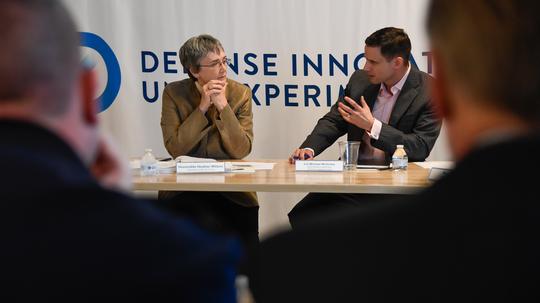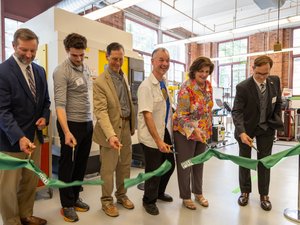
They're not only gunning for venture funding, they're also battle-ready: One startup creates artificial intelligence technology to protect soldiers and improve their performance on missions. Another scours to the web to spot potential threats — such as bank hackers —to companies and other organizations. And one builds software to stop malware, ransomware and other cyber attackers.
These are a few of the companies with Boston-area ties that have been in the trenches with one of the biggest startup funders you've probably never heard of: DIUx.
Flying under the radar of many tech newcomers, the Department of Defense offshoot known as the Defense Innovation Unit Experimental has taken aim at innovators in recent years, firing off some $226 million in contracts to dozens of tech companies throughout the nation.
Targeting Boston-area brainpower, DIUx set up an office in Cambridge nearly two years ago — and it's growing in presence.
“We have tremendous resources here in Boston,” said Col. Mike McGinley on why DIUx opened one of its two main offices in the Hub.
Another DIUx post is in Silicon Valley, and two other units are located in the Pentagon and Austin.
Pointing to the area's rising innovation and high-tech industries, the many universities and colleges here, and the proximity to Hanscom Air Force Base, Col. McGinley suggested DIUx expects to tap more Hub talent in coming years.
“We’re sitting at the doorstep of Tufts, MIT and Harvard... You have over 100 universities in the area," said Col. McGinley, a lawyer and current Air Force Reservist.
Companies with Boston connections that have gotten projects funded through DIUx so far include cyber threat detector Recorded Future, Shield AI and Carbon Black.
“It’s been a super positive experience,” said Christopher Ahlberg, chief executive and co-founder of Recorded Future, a late-stage tech company based in Somerville.
So far, Recorded Future has taken in nearly a half million dollars in projects from DIUx, according to data obtained from GovTribe.com (Ahlberg and Col. McGinley declined to disclose the payment amounts). While that’s a tiny fraction of the tens of millions of dollars in venture capital funding the group has received over its nine years, Ahlberg said the money is only part of the attraction of working with the military.
“It comes with expertise and access,” he said of its relationship with the military. “It could be that they have domain experts on hand… know-how for contracting… or very specific technical experts.”
Unlike with venture investments, he added, the DIUx work “is very pointed… and targeted at accomplishing particular goals.”
And there’s no loss of ownership for the startup. “We do not take an equity stake in the company,” said Col. McGinley.
Instead, the funding operates more like mini-contracts for the companies it works with.
The application process is also fast and slick compared with typical military contracts that can get bogged down in bureaucracy, said the colonel. Outlining how DIUx works, he said a branch of the military, such as the Navy or Army, will identify a problem or need, and then the group's staff will help them describe it briefly in clear English in a request for proposals. Within about 30 days, the group will sift through the responses, and then interview companies who have potential solutions. The entire bidding process can take as little as a couple months. In return for the funds, the military will typically get a prototype, testing or actual product, while intellectual property is negotiable but typically stays with the startup.
“It’s all about speed,” said Col. McGinley, noting that other defense contracts can take years to complete. “We’re saying: ‘We, the DoD, have a problem, and, private sector, how can you solve it for us?’”
With its growing presence here, the group also collaborates with area universities, such as MIT, and hosts events, such as this Thursday's Defense Innovation Board meeting in Cambridge that is slated to include Eric Schmidt of Google fame. By later this spring the Cambridge DIUx office will be staffed with about 11 full-time employees and 15 part-timers. Most are military personnel and a few are civilians.
"It was really encouraging to see that DIUx – one of a number of innovation initiatives and programs created by former Sec. Ash Carter – was choosing not only to be in Silicon Valley, but recognized Boston’s unique attributes as an innovation ecosystem," said Fiona Murray, the Associate Dean for Innovation at MIT, in an email to BostInno. She said she met DIUx staff when they first opened shop in Cambridge. "I think Boston has been welcoming to DIUx and other DoD innovation activities.... This shouldn’t come as too much of a surprise – after all places like MIT have long supported major defense activities, including its work on radar during WW2. And we have many active duty officers on campus who bring unique experiences and service into the classroom."
The vast majority of the funding that DIUx hands out comes from various branches of the military, but a small portion — in the tens of millions — is appropriated from Congress.
Specific areas that the group is seeking to fund include artificial intelligence and machine learning; information technology; space technology; autonomous systems; and technology that helps improve performance and training of pilots, soldiers and other military personnel.
DIUx began a few years ago as the military saw it was lagging in research and development, said Col. McGinley, noting that until the latter part of the 20th century, the Defense Department spent far more than the private sector. Nowadays, startups and their venture capital backers, and other technology companies, invest far more in innovation. At the same time, technology in general is more easily accessible to anyone, including our enemies.
"If you look at who is leading this… it’s the commercial sector," he said. And, "if you look at the current threat environment … many threats … stem from a democratization of technology."
Reporter's note: This story was updated with a quote from MIT on April 26.








